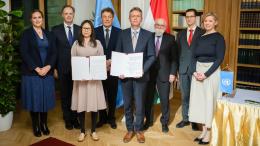On 15 May 2025, the United Nations University (UNU), in partnership with The Elders and The Genron NPO, co-hosted a landmark event titled “80th Remembrance of Hiroshima and Nagasaki: The Imperative of Global Unity — How to Renew Multilateralism in a Fragmented World". The symposium drew over 300 attendees, including ambassadors, academics, civil society leaders, and former heads of state.
The event commenced with opening remarks by Mr. Yasushi Kudo, Founder and President of The Genron NPO, who welcomed participants to what he described as an open forum for candid dialogue on pressing global challenges. Expressing gratitude to UNU and The Elders, Mr. Kudo underscored the urgency of action in a world facing deepening divisions and geopolitical instability. He highlighted Japan’s unique responsibility to champion multilateralism, reaffirming the importance of civil society in shaping global discourse and calling on participants to consider how collective solidarity can be restored in an increasingly fragmented world.
This was followed by a keynote address from H.E. Fumio Kishida, former Prime Minister of Japan, who warmly welcomed the distinguished presence of The Elders and reaffirmed Japan’s enduring commitment to nuclear disarmament and multilateralism. Reflecting on the significance of The Elders’ visit to Hiroshima – his hometown – on the 80th anniversary of the end of the Second World War, he expressed deep appreciation for their continued advocacy. “The elimination of nuclear weapons is a belief I deeply hold as a politician”, he declared, underscoring his personal and political resolve to advance a world free of nuclear weapons.
Former Japan Prime Minister Kishida warned of the growing threat posed by nuclear arms and the erosion of the rules-based international order, calling this moment “a critical juncture for humanity.” He reiterated Japan’s responsibility to foster global dialogue, stating that “Japan must continue to raise the banner of multilateralism, higher than ever before”, and cautioned that “acting solely out of self-interest at a time when global unity is urgently needed will risk repeating the mistakes of the past.”
The event’s centrepiece was a high-level panel discussion moderated by Professor Tshilidzi Marwala, Rector of the United Nations University and UN Under-Secretary-General. Bringing together a diverse and distinguished group of global leaders, the panel explored the urgent need for renewed multilateral cooperation in the face of mounting global challenges.
The panellists included H.E. Juan Manuel Santos, former President of Colombia, Chair of The Elders, and Nobel Peace Laureate; H.E. Ban Ki-moon, former Secretary-General of the United Nations and Deputy Chair of The Elders; Mr. Nobuo Tanaka, Chair of the Innovation for Cool Earth Forum (ICEF) Steering Committee and former Executive Director of the International Energy Agency; and H.E. Shorna-Kay Richards, Ambassador of Jamaica to Japan and Chair of the UN Secretary-General’s Advisory Board on Disarmament Matters. This diverse and distinguished group of global leaders explored the urgent need for renewed multilateral cooperation in the face of mounting global challenges. Each brought a unique perspective shaped by their leadership in diplomacy, peacebuilding, energy policy, and disarmament, contributing to a rich and thought-provoking exchange.
During the discussion, President Santos highlighted the recent clash between India and Pakistan, which regrettably prevented Elders member Ms. Hina Jilani from attending. He noted with concern that an escalated conflict between two nuclear powers would be unprecedented, and stressed the importance of dialogue at all levels to promote common solutions. “The principle that Nelson Mandela, founder of The Elders, so defended – the need for constructive dialogue – has disappeared. Dialogue has become more and more difficult. And without dialogue, no agreements are possible,” he warned.
H.E. Mr. Ban Ki-moon reflected on his tenure as Secretary-General of the United Nations and the persistent challenges he faced in advancing institutional reform. He emphasized the need for the UN to evolve in order to remain effective in today’s geopolitical landscape, stating, “Even now, reform of the United Nations is a huge task”. His remarks underscored the importance of perseverance and vision in strengthening multilateral institutions.
Ambassador Shorna-Kay Richards offered insights from her experience advancing nuclear non-proliferation as a representative of a small island developing state, reminding participants that “leadership should not be equated with might”. She echoed concerns about rising unilateralism and emphasised the interconnected nature of today’s global challenges. “Pollution knows no borders. Viruses do not stop at immigration checkpoints. The ocean, the wind, even misinformation flows freely”, she said, calling for inclusive and equitable global governance.
Mr. Nobuo Tanaka spoke about Japan’s unique role in promoting a stable multilateral order, particularly through energy diplomacy. He highlighted the strategic importance of energy cooperation, citing collaboration between Japan and the Republic of Korea as a model. Addressing the intersection of energy, climate change, and geopolitics, he advocated for the peaceful use of nuclear technology, stating, “We have to continue to commit to peaceful uses”.
Following the panel discussion, the floor was opened to the audience for a dynamic question-and-answer session, offering participants the opportunity to engage directly with the panellists on the pressing issues raised throughout the dialogue. Questions came from a diverse group of attendees, ranging from UN staff to academics and Japanese high school students. Topics included the role of youth in shaping the future, redefining global security, the governance of artificial intelligence, and the urgent need for reform of the UN Security Council.
In his closing remarks, H.E. Ban Ki-moon delivered a sobering yet hopeful reflection on the state of multilateralism. Drawing on his decades of service to international peace and cooperation, he warned that “multilateralism is indeed in a moment of crisis”, citing the erosion of global norms and the resurgence of nuclear threats. “Peace is too precious to rely on luck alone”, he cautioned, urging leaders to act with courage and foresight. He concluded with a call for a revitalized international system that is inclusive, representative, and capable of addressing today’s existential challenges. Encouraging young people to hold their leaders accountable, he reminded the audience that the future of global peace and security depends on the choices we make today.



